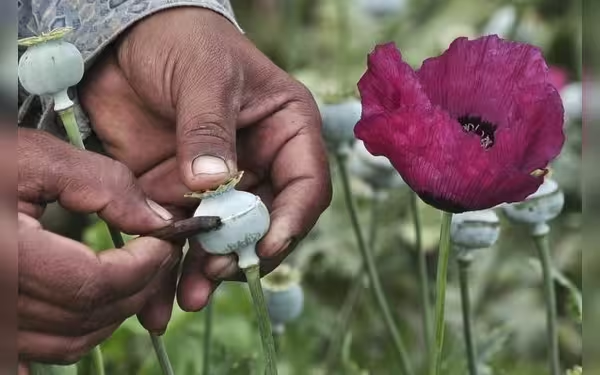Thursday, November 7, 2024 10:29 AM
Poppy Cultivation Surges 19% in Afghanistan
- Poppy cultivation in Afghanistan increased by 19%.
- Taliban rejects UNODC findings on drug trade.
- Shift in cultivation from southern to northeastern provinces.
 Image Credits: tribune.com.pk
Image Credits: tribune.com.pkPoppy cultivation in Afghanistan has surged by 19%, raising concerns over security and governance amid ongoing humanitarian crises.
In recent years, Afghanistan has been at the center of global discussions regarding poppy cultivation, a key ingredient in the production of opium. This year, reports indicate that poppy cultivation in Afghanistan has surged by an alarming 19%. This increase raises significant concerns for both local and international communities, as it poses challenges to security, governance, and public health.
The United Nations Office on Drugs and Crime (UNODC) has highlighted a notable shift in the geographical focus of poppy farming. Previously, the majority of poppy cultivation was concentrated in the southern provinces, which are known strongholds of the Taliban. However, the latest findings reveal that cultivation has now moved to the northeastern provinces of the country. This shift not only reflects changing agricultural practices but also indicates a potential change in the dynamics of power and control within Afghanistan.
In response to the UNODC report, the Taliban government has expressed strong disapproval. Interior ministry spokesman Abdul Mateen Qani stated that the Taliban “fully rejects” the findings, labeling them as “far from reality.” This rejection underscores the ongoing tension between the Taliban's governance and international perceptions of their control over the drug trade.
The implications of increased poppy cultivation are profound. For Afghanistan, a country already grappling with economic instability and humanitarian crises, the rise in opium production could exacerbate existing issues. It may lead to increased violence, as rival factions vie for control over lucrative drug routes. Furthermore, the international community faces the challenge of addressing the consequences of this cultivation, which often fuels addiction and crime in various parts of the world.
As the situation unfolds, it is crucial for both Afghan authorities and the international community to engage in constructive dialogue. Addressing the root causes of poppy cultivation, such as poverty and lack of alternative livelihoods, will be essential in finding a sustainable solution. The future of Afghanistan depends not only on its governance but also on the well-being of its people, who deserve a chance at a better life free from the shadows of the drug trade.













